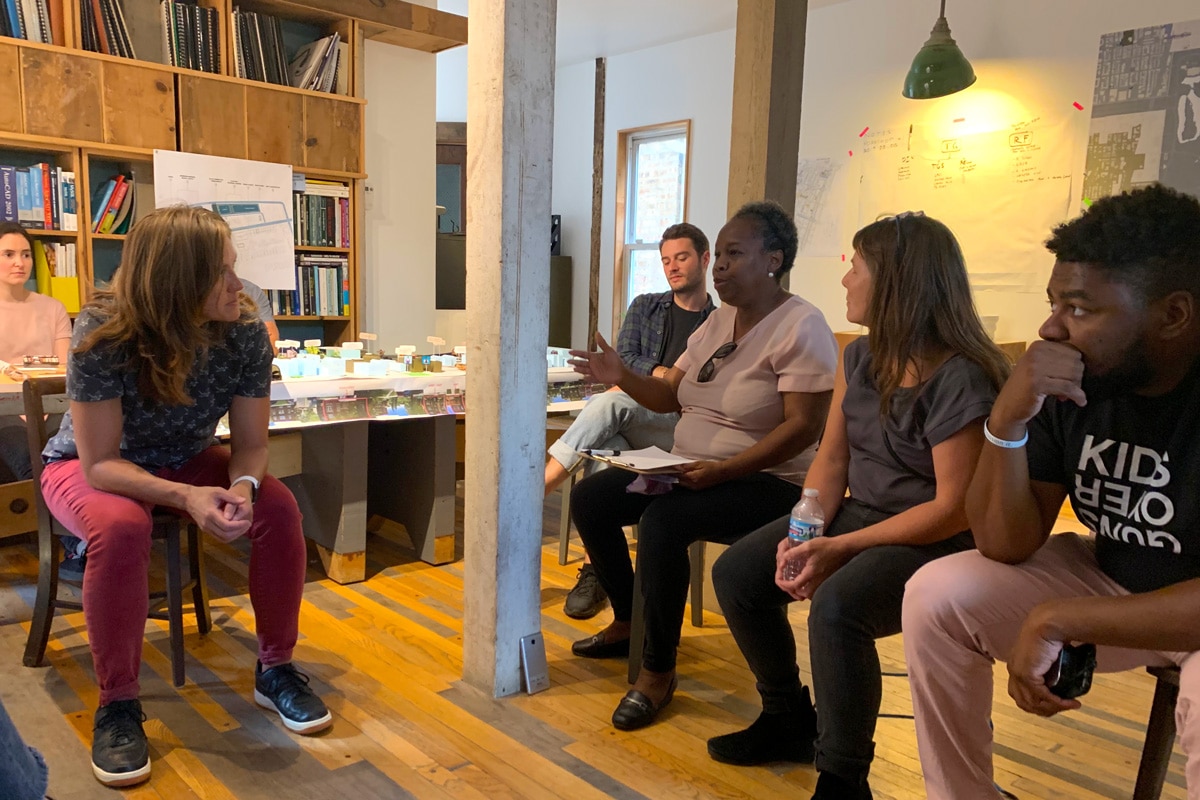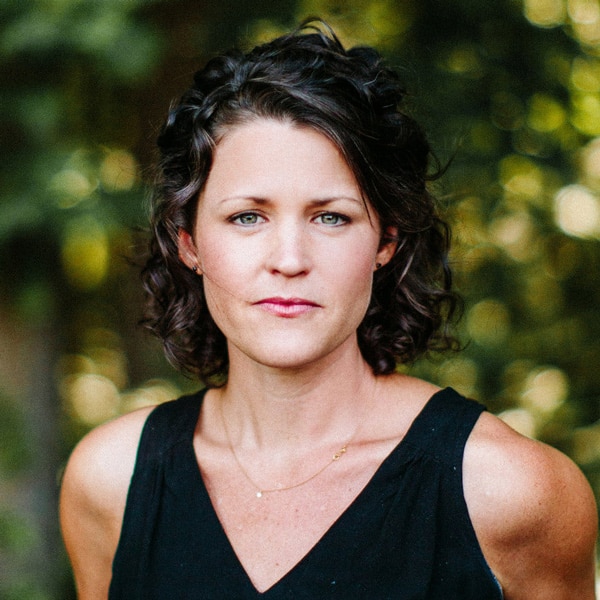Passport to Peace Draws Together 200 Neighbors
On Saturday, September 7, the Chicago Peace Fellows gathered in Cooper Park in the West Pullman community on the Far South Side to spread peace. Hosted by Pastor Robert Biekman, this event was the second of the Passport 2 Peace series, one of the Chicago Peace Fellows’ summer projects. Each event in the series is being held in a different community but all include peace building activities such as intergenerational peace circles, yoga, mediation and entertainment. The final event will be held Saturday, September 28.
The Cooper Park event was attended by over 200 community residents who participated in activities such as Tai Chi, reflexology and meditation. Each guest received a “passport” with the task of visiting booths and participating in the activities, which would earn them a stamp. One Peace Fellow, Robin Cline, came very close to visiting each activity, and many at the event went from station to station learning more about what peace feels like.
Fellow Gloria Smith, executive director of the Black Star Project, commented, “I loved every minute of it, including the tai chi exercises and the intergenerational peace circles. I also really enjoyed the camaraderie among the people in attendance.” Gloria was part of the planning team for the event, and worked closely with Robert to put the event together.
Robert noted that several years ago, the Cooper Park playground had been the location of a horrific incident in which two young men were shot. Because of that incident, the park was saddled with a reputation as a violent place and many neighborhood residents refused to utilize it. Robert envisioned hosting Passport 2 Peace in the park, therefore, to challenge that narrative and have people actively think about peace in that park.
“Passport 2 Peace exceeded our expectations!” Pastor Biekman reflected.
Peace Fellows Tour University of Chicago Crime Lab
On Friday, August 30, the Chicago Peace Fellows toured the University of Chicago Urban Labs to learn more about the work of the Crime Lab, hosted by Kimberly Smith, associate director of criminal justice initiatives.
Kim talked about how the Crime Lab started with the idea to leverage the intellectual capital of the University of Chicago to address violence in Chicago. In 2007, the University was reeling from the shooting death on their campus of an international student during an attempted robbery. Their solution was to ask what the University’s faculty members were good at and how could they use their talents to serve their surrounding community.
[quote]The University of Chicago is the home of more Nobel Prize winners than any other institution in the world, and the school is a hub for research of many kinds, scientific to historical. Could they use those techniques to encourage research on the causes and solutions to violence in the communities that surround the university?[/quote]
They began to work with community organizations to add value by providing research and evaluation support. They identified one organization that was producing tremendous results and helped them grow their programming, and they are working with several other groups across the city that are tackling issues of violence in the city to identify effective strategies.
Much of the meeting was spent fielding questions from the Chicago Peace Fellows about how the Crime Lab does its work. They asked about the Crime Lab’s work with the Chicago Police Department, particularly how the Crime Lab is working to support officers and their relationship to the community. Robert Biekman wanted to know about the Crime Lab’s analysis of the federal consent decree that is designed to change the policies and procedures of the Chicago Police Department.
Dr. Sokoni Karanja asked about accessing data on community policing programs, which began a conversation about data sharing and how the Crime Lab provides data to grassroots organizations to measure impact. Many of the Chicago Peace Fellows have been doing tremendous work in their respective communities for years and were open to utilizing the support of the University's researchers to document their efforts and learn more about what’s most effective.
The meeting was a great demonstration of how communities can work with institutions to solidify best practices and identify promising solutions to the myriad of issues that communities across Chicago face.
The Role of Urban Planning and Design in Building Safe Communities
How can architects and urban planners work with grassroots activists to make neighborhoods safer?
That was one of the topics of a deep and wide-ranging conversation on August 27 between several Chicago Peace Fellows, Mallory McClaire, chief of staff of the Rebuild Foundation, and Gia Biagi, principal of urbanism and civic impact at famed architectural office Studio Gang.
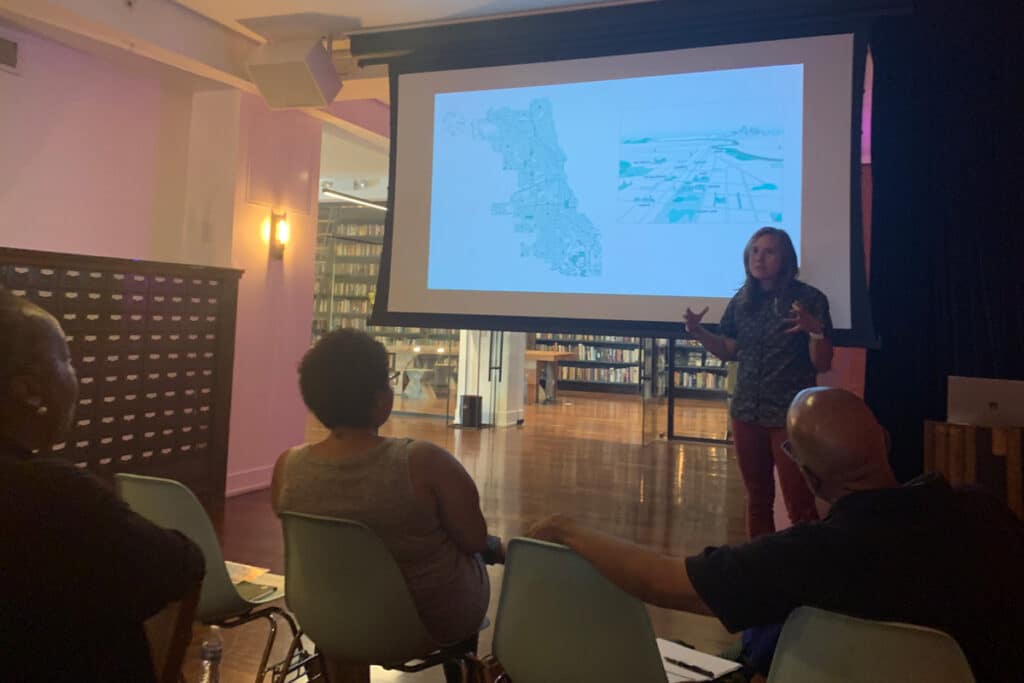
The discussion took place at the Stony Island Arts Bank, a historic financial institution on a main boulevard in the Grand Crossing neighborhood on the South Side that had fallen into disrepair, but was rehabbed into a gallery space, archives and community art center.
While the Fellows ate lunch, Gia began the meeting with a presentation of several projects she and her team had completed in which they explored the assets that community anchors and public spaces can become when cities and citizens invest in collective urban life. She reviewed two projects, Reimagining the Civic Commons and the Mayor’s Office of Criminal Justice: Neighborhood Activation Study in New York, both of which look at civic assets like parks, libraries, and schools as more than physical spaces, but as opportunities for social transformation and inclusion.
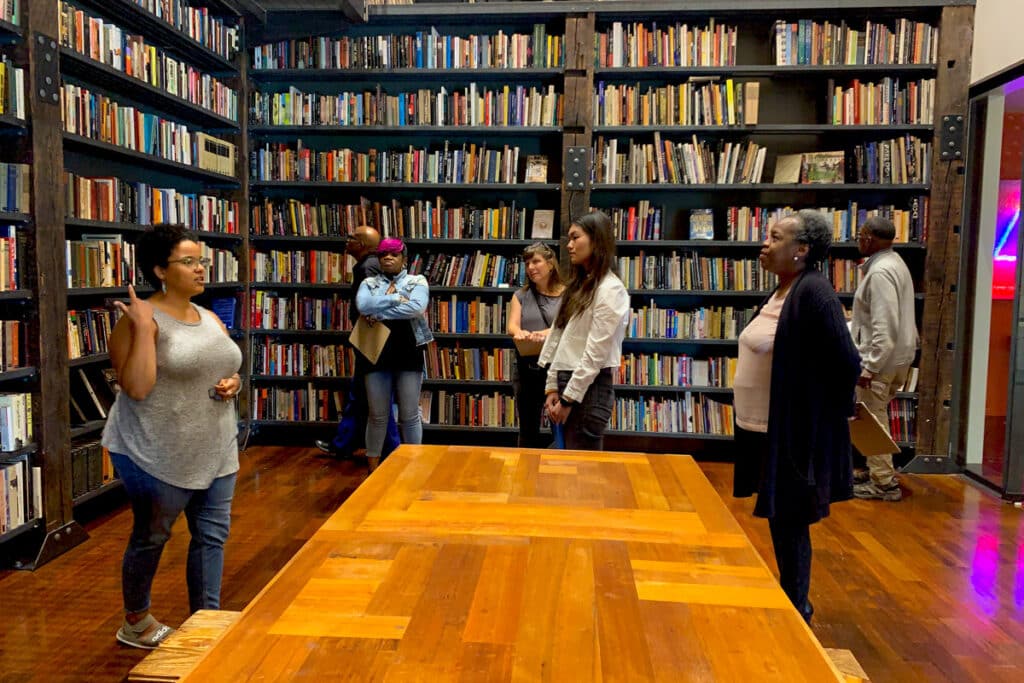
Mallory gave an overview of the Rebuild Foundation, a platform for art, cultural development, and neighborhood transformation. Founded by Chicago-born artist Theaster Gates, their projects seek to strengthen communities by offering free arts programming, creating cultural amenities within the neighborhood, and developing affordable housing and work/studio space for local residents.
The Rebuild Foundation’s work is informed by three core values - Black people matter, Black spaces matter, and Black objects matter. -- Mallory McClaire
The Rebuild Foundation recently hired Studio Gang’s Urbanism and Civic Impact team to create a strategic plan to leverage the properties they own to collectively improve the lives and livelihoods of the neighborhood residents.
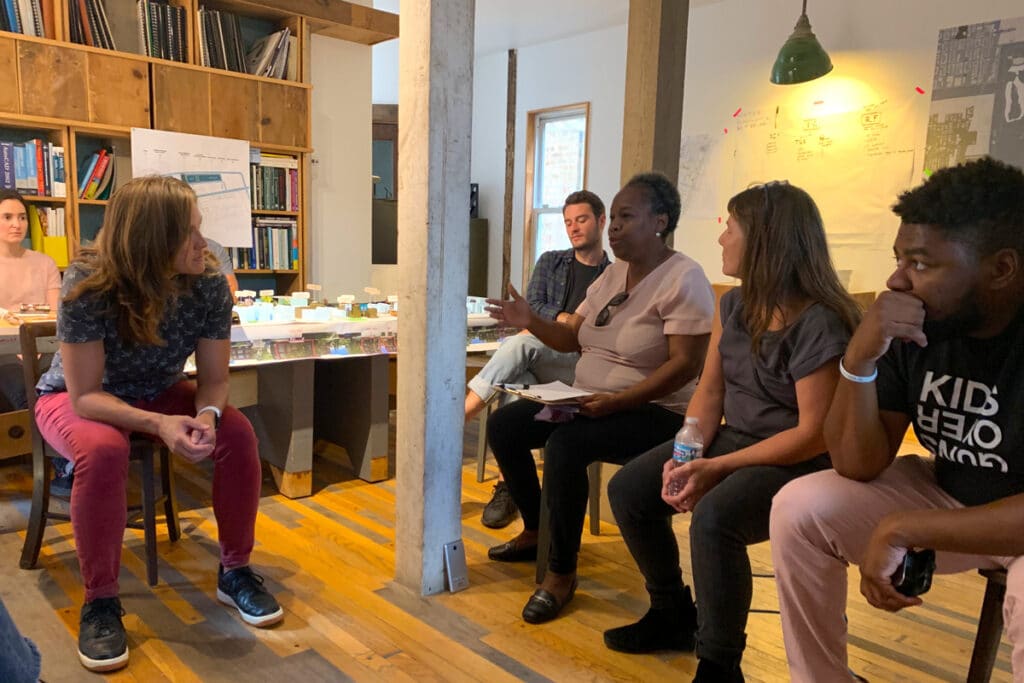
After these presentations, Mallory led the Fellows on a tour of the Stony Island Arts Bank, where they sat in the original leather chairs preserved from the office of Ebony/Jet Founder and Publisher John H. Johnson, reviewed the enormous Johnson Publishing Book Archive, and admired legendary DJ Frankie Knuckles’ record collection. Mallory took the Fellows to a special room where a collection of racist memorabilia and propaganda had been collected and tucked away in drawers, to be reviewed only during facilitated discussions. Fellows compared this alternative display technique with the Field Museum’s Sculptures of Mankind exhibit they viewed and discussed with staff at that institution recently.
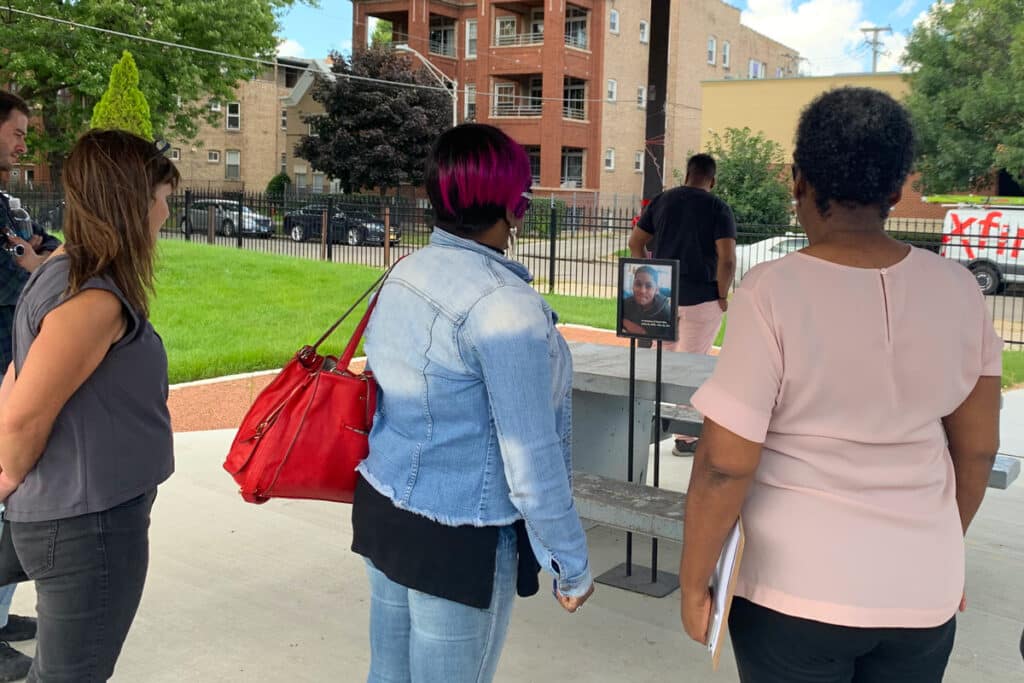
The Peace Fellows solemnly visited the exhibit Objects of Care: Material Memorial for Tamir Rice, the gazebo in which the 12-year-old Tamir Rice was playing when he was shot to death by a Cleveland police officer in 2014. Having fought against the gazebo’s demolition, Samaria Rice, Tamir’s mother, requested that the Rebuild Foundation preserve it as a space for community care, dialogue, and public engagement.
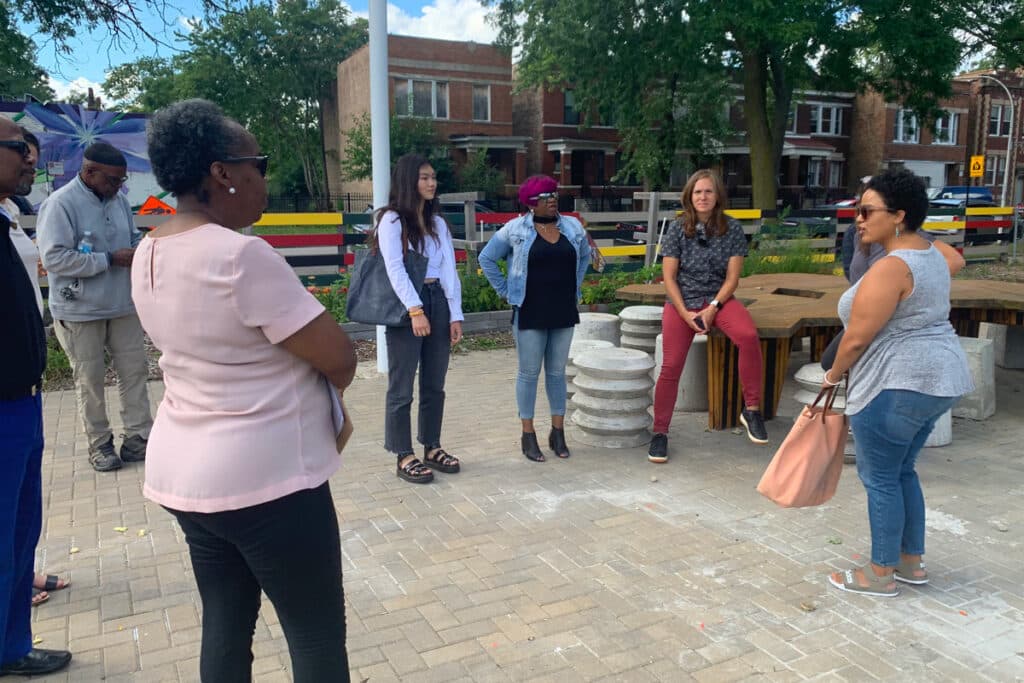
Mallory and Gia then took the Fellows on a tour through the neighborhood, stopping at the buildings renovated and owned by the Rebuild Foundation. The first stop was the Dorchester Community Garden, a public garden space created in partnership with the Rebuild Foundation and NeighborSpace. As children ran through the raised planters and climbed on the built structures, Peace Fellow Robin Cline, assistant director at NeighborSpace, talked about the history and creation of the garden and the impact it has had on the neighborhood.
“A successful space depends so much on the eyes on the space and the commitment to welcome people to sit in these public spaces. We’re going to program the spaces, make the spaces have meaningful activity, and we’re OK with people using the space the way they might want to use it.” -- Robin Cline
The group then gathered around snacks and beverages at Rebuild’s “Listening House” and toured the on-site workspace Studio Gang set up. They also reviewed a model of an asset map of Rebuild and the surrounding neighborhood. Amidst precedent images, working models, and sketches, the group discussed the potential to use the tools and insights of urban planning and civic design to create impact through the built environment and how it could influence their own work.
Fellow Sokoni Karanja talked about the grassroots peace-building efforts in his neighborhood near Washington Park. He relayed to the group how organizing Saturday street cleanings, organizing tenant unions and block clubs, creating several community phone trees, and getting commitments from local citizens and business owners recently helped reduce violence in his neighborhood from 27 homicides in 2016 to 2 so far this year.
“I think violence prevention may be the ultimate goal of our initiative, but really what we want is community cohesion and developing norms of what the community will and will not tolerate. That’s really where the impact will come from. Violence prevention stems out from that.” -- Sokoni Karanja
Mallory spoke about Rebuild’s history as an organization built by an individual’s desire to invest in his own community. Theaster Gates grew up in Chicago and continues to live in the neighborhood, desiring to be an example of what it means to invest in your community. Rebuild has found that their neighbors want transparency as well as a pathway to engagement.
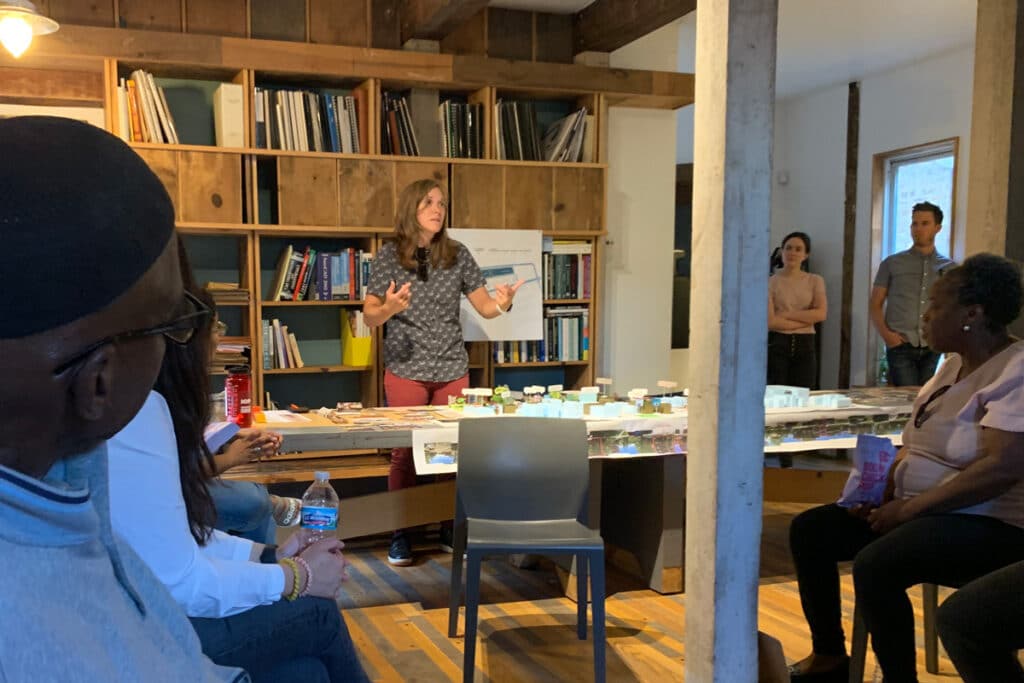
Fellow Jackie Moore said that invitation was all the more important because Greater Grand Crossing has a low percentage of home ownership. When she drives up and down streets in her community, some are pristine and others are not, and almost always, the condition of the street has a direct relationship to whether people own their homes.
When I own the land, I don't need to wait for permission. I don’t think it’s from lack of interest, or lack of design. I think it’s from lack of agency. When you own something, you don’t wait for others to take care of it. When you design spaces with the assumption that they will take care of what has been designed for them, you open yourself up to more opportunities.” -- Jackie Moore
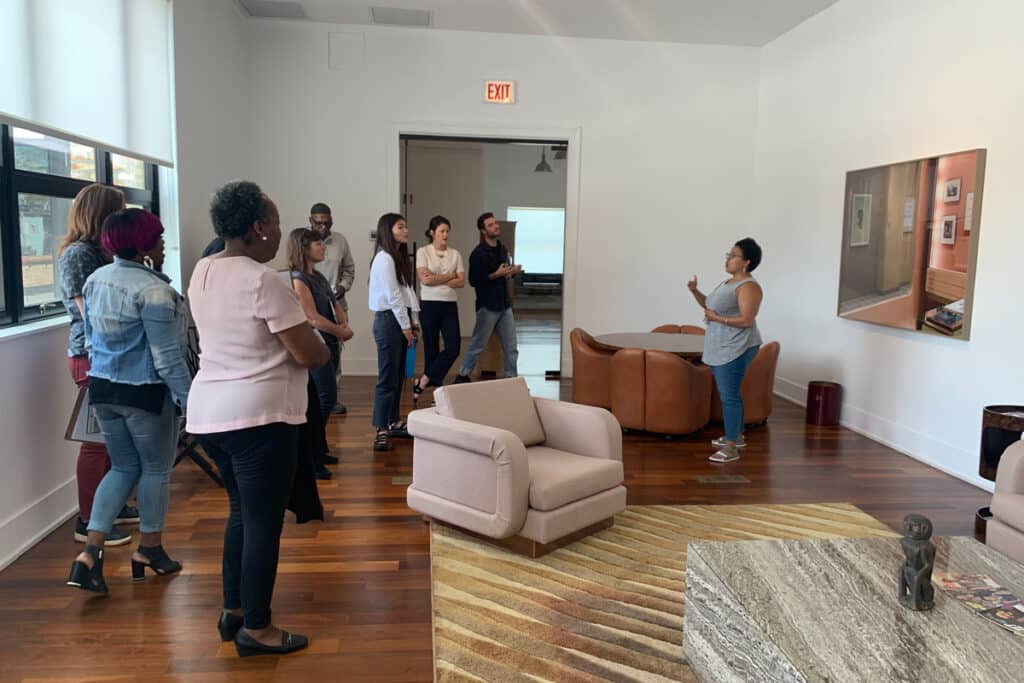
The meeting concluded with a discussion of resources, grants, land trusts and Tax Increment Financing districts - mechanisms that have been set aside for community development - as well as who has figured out how to leverage these resources. The Fellows agreed that urban planners like Gia and her team, and developers and organizations like Rebuild Foundation are potentially good partners for grassroots leaders who are daily making change in their neighborhoods. In addition to well-designed public spaces and informed public policy, planning and design tools can help support the visualization of goals, creation of processes, and leveraging of assets in the work of peace building in our physical environment.
Peace Fellows Explore Decolonizing Philanthropy with Edgar Villanueva
In his book, “Decolonizing Wealth: Indigenous Wisdom to Heal Divides and Restore Balance,” Edgar Villanueva makes a strong and needed critique of traditional philanthropy. In many ways, his analysis is similar to that made by my late brother, Phillip Jackson, who was the founding director of the Black Star Project.
Phillip was an important inspiration to Edgar, and Phillip’s influence is powerfully reflected in the book. In 2016, my brother led a major local and national campaign taking the foundation world to task for policies that have exacerbated the extraordinary poverty of communities of color in the richest nation in the world.
As one example, Phillip decried as “modern-day redlining” the tiny percentage of grants to Black organizations from the Chicago-based John D. and Catherine T. MacArthur Foundation. He believed that funders ought not to pat themselves on the back if they are unwilling to acknowledge and provide direct support to the Black and Brown communities that continue to suffer in the margins of the great wealth in this city and country. This wealth, after all, was made possible by public policies that disenfranchised people of color and kept our neighborhoods poor and vulnerable.
[quote]Edgar read about my brother’s work as he was writing his book and interviewed Phillip as part of his research. Unfortunately, Phillip passed away November 4, 2018, before the two men could meet in person.[/quote]
But from his family home in North Carolina, I recently had the great pleasure of meeting Edgar during a video roundtable that included the current cohort of Chicago Peace Fellows (of which I am a member), the international alumni of GATHER, and several staff of the Goldin Institute. Since my brother’s passing, I have continued his work as the executive director of the Black Star Project and I am certain that Phillip would be delighted and proud of Edgar’s vision for a new approach to more fairly and humanely distribute the tremendous wealth of foundations in this country.
Part one of “Decolonizing Wealth” addresses how philanthropy mirrors colonialism, sometimes doing more harm than good, and the importance of hearing the stories of colonized people with a respectful and open heart. Within the chapters of part two, Edgar outlines seven critical steps—Grieve, Apologize, Listen, Relate, Represent, Invest and Repair—to healing centuries-old trauma. He asks: 1) What if money could be medicine instead of what divides us? and 2) What if, rather than using wealth to cause further harm, we followed these “Seven Steps to Healing?”
During our roundtable discussion on August 23rd, Edgar talked about how indigenous wisdom has shaped his life and perspective on philanthropy. Chicago Peace Fellows Robert Biekman asked about the role of spirituality in philanthropy, and Dr. Sokoni Karanja, who attended a peace walk with Edgar many years ago, asked if social workers today should take a more activist/organizing roles in philanthropy. International GATHER alumnus Yusuph Masanja received advice on managing a fundraising issue.
Edgar acknowledged the good work of all of the Fellows and offered some recommendations for the use of restorative justice and methods of truth and reconciliation in their efforts. He also encouraged Fellows to build personal relationships with funders as they move forward together.
Edgar Villanueva understands decolonizing as a lifelong journey, and is thankful to his Native elders and to those who came before him, like Phillip, who shaped his early thinking on what philanthropy should and can do to right historical wrongs.
It was my great joy to meet him and to learn from his thoughtful and stimulating new book!
Chicago Youth Exchange Builds Trust in the Great Outdoors
Six thirty a.m., Sunday morning, teens ages 15-21 wait in great anticipation for the bus that will take them away from the Windy City, Chicago, with the bright lights, loud noises to the serene shores of Lake Geneva, Wisconsin - the Outdoor Wisconsin Leadership School (OWLS) in Williams Bay, Wisconsin.
[quote]For many of the youths, this is going to be their first experience camping and the questions are non-stop, from “What type of bus will we ride on?” to the physical layout of the facility, all of which I can’t answer since this is my first experience camping as well.[/quote]
During our initial encounter as Chicago Peace Fellows, several of the fellows talked about their work with young people during the summer and the possibility of hosting an overnight camping trip for youths from the various communities. As one of the eight funded summer projects, the cohorts from the New City, South Shore and Little Village communities collaborated on a Youth Exchange 3-day camping trip which would allow black and brown youths from the various communities to get to know one another, explore similar experiences, and create an ongoing bond which would facilitate additional collaborative activities.
The Outdoor Wisconsin Leadership School welcomed our group with open arms. They excitedly celebrated our arrival as they asked the youths to settle in and grab lunch because then it was activities planned from the moment we arrived until the time we left. Our first afternoon began with building trust activities. The youths were divided into three random groups, each decided on a name for themselves, and then continued on with activities accordingly. Activities included talking circles, trust exercises, high ropes, low ropes and general recreational activities. On Monday, the youths participated in rock climbing, archery, fishing, swimming, canoeing, nature walks and sports and recreation. All the activities were geared toward establishing a bond among the youth. And what's a camping experience without a night adventure walk and toasting marshmallows by the campfire?
In addition to the relaxation and fun, the youths were challenged to address life challenges and, in some cases, had emotional moments related to their personal fears and frustrations as well as mistrust. Some recounted criminal activity and family involvement with DCFS. The opportunity to address the youths in these situations proved to be a rewarding experience for both the youths as well as the Fellows, who assured the youths there were adults who were there for them to help them on their journey. In some cases, youths were purposefully invited due to the overburdensome responsibilities they faced as older siblings. The opportunity to be among their peers away from the city and a break from their home life was most rewarding.
Fellow Pamela Butts was the coordinator for the event, and she was exceptional in her leadership skills and generosity to make sure the youth had a pleasant experience, nothing lacking. Several of the OWL counselors expressed how their lives were changed by having someone take the time with them to show them a different path such as what we were doing, and applauded us for our efforts. The experience resonated with them so much that they returned to become counselors after having the experience as a youth participant. Before we left, several of our youths also expressed a desire to learn more and possibly apply to work with the camp next year.
Our thanks also goes to Burrell Poe, who made sure every youth had a backpack and flashlight for their journey. Collaborating with the Chicago Peace Fellows has opened so many doors for the residents of Chicago, and given these youths opportunities they would not have otherwise experienced. I would also like to thank Fellow Gloria Smith, who provided Chicago Sky tickets which we were able to offer some of our youths who were unable to attend the camping trip.
Overall, we will continue to “Change the culture and break the cycle of violence” in our communities by providing positive opportunities for youth to strive toward productive citizenship.
Advocates: Parks an Essential Community Resource
The DuSable Museum of African American History hosted a panel July 25 called “Black and Brown Lives in Green Spaces: Race and Place in Urban America.” The panel featured several voices that work on this issue across the city and in different disciplines: Tonika Lewis Johnson, an Englewood resident and member of Resident Association of Greater Englewood (RAGE) who is the artist behind the Folded Map project; Juanita Irizarry, executive director, Friends of the Parks; and Brian McCammack, the Beerly Assistant Professor of Environmental Studies and chair of Urban Studies at Lake Forest College and the author of “Landscapes of Hope: Nature and the Great Migration in Chicago.”
The conversation covered many aspects of the development of parks in Chicago and how racism and segregation impacted where parks were and how they were funded. Many of the parks were built for white residents in the city and many had explicitly exclusionary policies for the city’s African American residents.
There were many flash points where these discriminatory practices were challenged on Chicago Park District property, including an incident in 1919 at 29th Street Beach, where white residents attacked black beach goers that led to the death of Eugene Williams, which resulted in widespread violence between the city’s white and black residents.
Tonika Johnson talked about her work with the Folded Map Project, which pairs residents on the predominantly black South Side of Chicago with their neighbors on the predominantly white North Side of the city. The project has raised a ton of conversation about segregation in the city that has historically been an issue in the city. Tonika has advised the Peace Fellows previously and is herself a grantee of the Chicago Fund for Safe and Peaceful Communities.
Juanita raised concerns about the use of park land for private developments and ensuring that communities have a voice in the kind of programs are offered in the parks across the city. Brian McCammack talked about how the historic issues of segregation in the city have impacted how the city allocated resources to neighborhood parks in the city. One issue he highlighted was the lack of pools in parks in African American neighborhoods and how not having access to pools in their neighborhoods forces them to go to other places when hot days come around.
Chicago has a rich history of parks that is coupled with issues around segregation. Groups like the Chicago Peace Fellows utilize parks to foster community. Peace Fellow and Pastor Robert Biekman brought his community together by working with people who were participating in a little league in his neighborhood park, Maple Park, to start the conversation about how to address violence in the community. Jamila Trimuel, founder of Ladies of Virtue, runs a program with the Chicago Park District every summer to offer young women a community where they can learn in a safe environment.
The parks are important spaces for many Chicagoans and we must utilize this resource equitably.
Peace Fellows Present to Partnership for Safe and Peaceful Communities
On July 24, a delegation of Chicago Peace Fellows presented their work together thus far to a large meeting of 2019 grantees as well as the funders of the Partnership for Safe and Peaceful Communities, a coalition of more than 40 Chicago philanthropies and donors who have provided grants to community groups trying to reduce violence in disproportionately affected neighborhoods on the South and West sides.
The Peace Fellows were part of the agenda for the conclave at the Hatchery, a spacious new not-for-profit on the West Side that provides training as well as modern facilities to aspiring food entrepreneurs, including equipment for cooking, freezing and storage as well as events.
Attending on behalf of the Goldin Institute were Fellows Maria Velasquez, Robert Biekman, Jacqueline Moore, Pamela Butts, Jamila Trimuel, and Gloria Smith along with artist Cecil McDonald, who is documenting the program in video and photography, Lisa Dush, a professor at DePaul University who is conducting a professional evaluation of the GATHER software and curriculum, and Goldin staff members Oz Ozburn and Burrell Poe.
Burrell began with a brief summary of the genesis of the Peace Fellows, explaining that Goldin staff conducted extensive interviews with previous grantees of the Partnership to find out what they needed and how a curriculum could serve them. All of the Peace Fellows are previous grantees of the Partnership, and many have received current grants as well.
Each of the Fellows then took turns presenting different aspects of the program, interjecting their personal experiences and observations at appropriate moments along the way.
Maria described the strong sense of camaraderie among the Fellows, and extolled the practical benefits of collaboration and sharing:
[quote]I’m just so happy to be a part of this cohort, because it makes our communities strong. -- Maria Velazquez[/quote]
Robert explained that he was thrilled to discover that the Peace Fellows curriculum was focused on action, rather than theory, as well as accountability that came through honest collaboration and support. In his work as a pastor and organizer, Robert has participated in many different programs and fellowships, but he often lost interest as they proved impractical or didn’t sufficiently involve community residents. He remained highly involved with the Peace Fellows, however, because it provides access to places and people who would not be available otherwise. In particular, the curriculum has allowed him to continue the connections he established with young men in different stages of the criminal justice system beyond the short terms of the grants from the Partnership. He has even been able to build bridges between different groups working on violence-related issues from multiple angles and involve them in efforts to craft solutions.
[quote]Using the tools that GATHER has provided in the curriculum and also working with Peace Fellows, it has allowed me to take that moment and make it into a movement, to go from a place where we are doing community outreach to do community engagement, to be able to build the kind of relationships that provide long term sustainability for the efforts we are engaged in. -- Robert Biekman[/quote]
Robert continued, “GATHER has allowed me to create a community of practice with all of those who are directly impacted by the issues of our community, to gather us together to see what are the real key issues and most importantly to invite them to participate in making the changes that are necessary because those who are closest to the problem often have the best solutions.”
“So often, we do this work, and we do it by ourselves, and for me what this has provided is a watering hole where I’m able to go in the midst of all the other work we do in order to drink deeply with others who are doing the work we are doing. That gives us a personal sustainability to each of us.”
Gloria said that the individual Peace Fellows are all part of broader group of community-based organizations that often work together. She recently moved to Chicago after the death of her brother, Phillip Jackson, and took over as executive director of the organization he founded, the Black Star Project. She has hit the ground running, maintaining and even expanding partnerships and initiatives, and on one day, Gloria found that she had three commitments for the same day, so she asked another Peace Fellow, Velvian Boswell, to stand in for her. She was greatly appreciative for that level of support from the Peace Fellows.
[quote]“We’re all connected. We’re all a network of hope. -- Gloria Smith[/quote]
Pamela Butts echoed the sentiment that the collaboration with her peers – people with similar experiences in community work – has been extremely rewarding: “Peace Fellows has given us an opportunity to develop relationships, resources and opportunities we never dreamed of.”
[quote]These are folks who have been out there on the front lines for years just doing the work just because people have needs. -- Pamela Butts[/quote]
Jamila said she had participated in multiple fellowships and residencies, and wasn’t inclined to apply for another one, but when she received the e-mail from the Goldin Institute during a college tour with the girls in her program, she thought the Peace Fellows would be different. She was intrigued by the prospect of working with other organizers in Chicago:
[quote]I wanted to connect more with people on the ground. It’s hard to find that kind of learning community here in Chicago. -- Jamila Trimuel[/quote]
“I took a pause (to check out the Peace Fellows) because I realized for the first time I would be part of a fellowship program where there would be people who are on the ground who are from communities, who love Chicago like I love Chicago and who want to ensure that Chicago is a better place to live and to serve.”
Jamila recounted several emotional meetings, including one where the Peace Fellows advised the staff at the Field Museum of Natural History about the future presentation of an exhibit with a racist and colonialist past. On another group outing to a neighborhood, the Peace Fellows saw a police action, while across the street children were playing, a sad juxtaposition that reflected the realities for too many families in Chicago.
“We know we’re here to stay we’re here to make a true, lifelong difference in our communities and that’s what’s so special about Chicago Peace Fellows,” Jamila summed up.
Jacquelyn explained that the Peace Fellows had agreed on a set of guiding principles that were used to evaluate all proposals for summer projects, which would be supported by a fund assembled by the Goldin Institute. Among other principles, the group agreed the summer projects should promote peace, embrace new challenges and accountability, and include authentic community participation.
Ultimately, the group approved eight different projects, all of which incorporate multiple principles, ranging from information fairs to help ex-offenders expunge their records to a retreat for the Fellows to practice self-care and reflection.
“The projects are all very different. Collectively, they serve the entire city, are a great opportunity to show off what we’ve learned while we’re promoting peace and giving all of you guys the opportunity to partner with us,” Jacquelyn said.
Peace Fellows visit 10 Point Coalition in Indianapolis
On Tuesday, July 23rd, Chicago Peace Fellow Robert Beikman and his organization, Alternatives to Incarceration Collaborative, took a group of youths involved in his restorative justice program to Indianapolis to learn about the 10 Point Coalition and the work they do to tackle the issue of violence in their city.
The day started with a conversation with the Rev. Charles Harrison and Indianapolis Police Chief Bryan Roach, who talked about how the program started. The 10 Point Coalition started in Boston in 1992 as a response to violence in that city as a partnership between the police, clergy and community youth organizations to conduct outreach and connect with community members who are most at risk of being a victim or perpetrator of violence. The partnership encourages community leaders to work with police to prevent acts of violence from occurring by providing services such as mentorship, housing, and jobs.
Robert Biekman and his Alternatives to Incarceration team came to learn about the lessons of their actions. The group toured the neighborhood to get a feel of what it looks like in Indianapolis and some of the challenges they face around poverty, gangs and substance abuse. On the tour, an Indianapolis police officer got out of his car to join the tour and talked about his experience working with the program. Since the program began, there has been a decrease in violence in some of their most difficult communities.
[quote]They attribute the drop in violence to better relationships between the police and community. The tour really highlighted the severe challenges faced by the community and some of the similarities with Chicago neighborhoods such as Roseland.[/quote]
The young people that Robert brought from Chicago are a part of a program that provides an alternative to incarceration and teaches them how to be community leaders. All of the youth have been involved with the criminal justice system and the program partners with the courts to keep them out of jail. They attend training and do community service as an alternative to being incarcerated for low-level crimes, and the program helps them chart a new path.
10 Point participants voiced their concerns with the police and community leaders in Indianapolis about the hopelessness they face in Chicago and how violence is so widespread. Many feel that because of issues of hostility, it is difficult to chart a new path. Robert and the Rev. Harrison worked hard to assuage these fears and reinforce the idea that changing their lifestyles is worth the peace and freedom it brings. Overall, everyone involved found it a valuable experience.
To learn more, check out the local news coverage from Indianapolis which features a video review of the meeting.
Alderman Walter Burnett Advises Peace Fellows at City Hall
On July 16, the Peace Fellows met with one of Chicago’s most influential elected officials, Alderman Walter Burnett of the 27th Ward. Fellows Jacquelyn Moore, Pamela Butts, Jeanette Coleman, Gloria Smith and Adi Lerner as well as Goldin Institute Executive Director Travis Rejman and Coordinator Burrell Poe met with Ald. Burnett in his City Hall office.
The conversation began with an overview of the Chicago Peace Fellows program and then Travis set the context by asking how the Peace Fellows can enhance city-wide initiatives and, more generally, how grassroots leaders can connect and collaborate with their elected representatives.
Fellows Jackie Moore, Pam Butts and Adi Lerner all work with organizations that need additional space for programming, and asked Ald. Burnett if his office could assist them with accessing facilities owned by the city. The alderman explained that the city controlled mostly vacant tracks of land as well as distressed properties, which can be turned over to not-for-profit organizations if they have the resources to rehab, maintain and secure the buildings. The city prefers to sell former firehouses and empty school buildings to the highest bidder, while the county-controlled Land Bank has properties in their portfolio, the alderman added. Newly elected Mayor Lori Lightfoot is changing procedures to reduce aldermanic control, but may make the community’s input a more significant factor in determining the fate of the properties.
Responding to a request, Ald. Burnett offered to introduce Peace Fellow Gloria Smith of the Black Star Project to an official at the city’s Streets and Sanitation Department who might be able to help expand her group’s neighborhood clean-up program from a month-long to a year-around effort.
Ald. Burnett also discussed the city’s violence prevention efforts, noting that he was waiting for the new mayor to announce her administration’s strategy and reveal her priorities in the upcoming budget. He was personally motivated to see a reduction in the frequency of gun violence, noting that the son of one of his staff members was shot 3 times the previous weekend.
Burnett has a special perspective on the issue both as an elected official and as an ex-felon himself. At 17 years old, Burnett participated in a bank robbery and pled guilty to a charge of armed robbery, for which he was incarcerated for two years and three months. Today, he maintains relationships with many different neighborhood residents as well as with police officers.
[quote]I know people on the corners. I know the people coming home from prison. I know those guys, but I also know the police. The police ask me for help but they have a different perspective, a different job. -- Alderman Walter Burnett[/quote]
Burnett hopes that others who emerge from prison will be involved positively in peace-making. Often, these men fear that communicating with their former peers will leave them vulnerable to further criminal prosecution, but Burnett pointed out that Ceasefire and other programs have successfully employed these men to negotiate truces between rival factions and obviate violent incidents before they happen.
[quote]My way is to work behind the scenes to interrupt the cycle of violence. I'm an ex-offender, I know what this is like and what people can do. For me, it’s like a ministry.[/quote]
Peace Fellow Adi Lerner asked the alderman what the top priority should be for local government officials in this environment, noting, “For many people in our community, they don't see any help from the city.”
Ald. Burnett answered that jobs and economic opportunities were essential to reducing the incidence of violence in the short term, and that long-term plans would have to be implemented.
Several participants noted, however, that programming to reach younger teens was also necessary. Jackie Moore said employment was essential as part of a holistic package that includes education and social services for young men at risk of criminal behavior.
[quote]They want the things that jobs can give them. Responsibility and hope. They get criminalized so quickly and then the path to the future is closed. They can't get jobs if they have a record. We need to focus on teens that may have made a mistake to make sure they have a path forward outside the streets. -- Jacquelyn Moore[/quote]
Peace Fellow Pamela Butts noted that many of the young people in her programs are confined to certain areas because of gang boundaries: “We have programs for the kids that do well academically. We have things for athletes. We have things for kids that are in trouble. We don't have anything for the kids in the middle. How can we take better care of the kids that aren't already high achievers or at risk and tailor things to what they are actually interested in?”
Alderman Burnett quickly agreed, and said that even young people participating in programing in his office had to navigate gang lines: “The biggest challenge I see is that everyone feels invisible. We need to talk to people, especially kids. They want to hear from us. We need to adopt our kids and make them feel like kids, otherwise they try to act like adults when they need to be cared for.”
Peace Fellows Trained in Kingian Nonviolence
On Monday, July 8, the Institute for Nonviolence Chicago hosted a Kingian Nonviolence workshop for the Chicago Peace Fellows and grantees of the Chicago Fund for Safe and Peaceful Communities. The Institute for Nonviolence is a street outreach organization that specializes in connecting with individuals who are most at risk of being a victim or perpetrator of violence. They also provide support for families of victims of violence and help people returning from prison find resources such as jobs, housing or health related services. The Chicago Fund for Safe and Peaceful Communities provide small grants of up to $10,000 to grassroots community leaders who are hosting activities in neighborhoods on the West and South sides that have high rates of violence. All of the Chicago Peace Fellows were recipients of these grants in 2018.
The Institute for Nonviolence Chicago invited the Chicago Peace Fellows and grantees of the Chicago Fund for Safe and Peaceful Communities for training led by Benny Lee on the steps and principles of nonviolence as taught by Martin Luther King Jr to his organizers in communities across the nation. Benny is a former leader of the Vice Lords, a notorious gang on the West Side, who spent decades in prison. Benny talked openly about his stint on death row after he and several others were charged with inciting a prison riot in the ‘70s. He shared about how nonviolence principles changed his life and helped him learn how to solve conflict and fight for justice in a different way.
Through the training, Benny shared his vision for building the Beloved Community, an all-inclusive society built around universal acceptance, healing from trauma, and celebration of successes. He encouraged the participants of the workshop to join him and each other in building the Beloved Community.
The Chicago Peace Fellows and other grantees asked questions and participated in conversation with Benny and each other. One Chicago Peace Fellow, Adi Lerner, who works at the Westside Justice Center as a program director, asked,
[quote]“How do we truly embrace nonviolence in violent circumstances?” -- Adi Lerner, Chicago Peace Fellow[/quote]
Adi stressed that often she finds many of the people she works with are victims of overt violence but also violent systems such as forced poverty, mass incarceration and systemic oppression. Benny shared his experience in fighting against these forces for returning citizens, people coming home from prison, and how he has made breakthroughs in returning their rights such as getting licenses that they were previously prohibited from getting by the state of Illinois. He said the principles are his grounding metrics for how he takes action to fight for peace.
The Nonviolence Principles are as follows:
- Nonviolence is a way of life for courageous people.
- Building the Beloved Community is the goal.
- Attack the forces of evil, not persons doing evil.
- Accept suffering without retaliation for the sake of the Just Cause.
- Avoid inner-violence of the spirit as well as outwardly physical violence.
- The universe is on the side of justice.
Overall, the group really enjoyed the experience and connected with one another around the material. The Institute for Nonviolence hosts 3 day nonviolence workshops that are open to the public. Please visit their website to learn more about the organization, their upcoming events and trainings.







